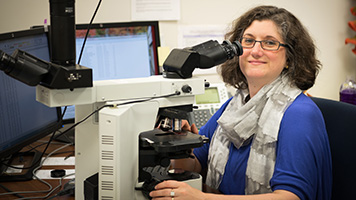- Position
- Professor and Chair; Director of Anatomic Pathology; Pathology, Anatomy and Laboratory Medicine, Pathology, Anatomy and Laboratory Medicine
- Phone
- 304-293-0198
Cytopathology
 The cytotechnologist and cytopathologist examine cells exfoliated or aspirated from various sites. Cells can be aspirated by a pathologist or clinician from palpable lesions, such as those in the thyroid, breast, and soft tissue or aspirated under CT, ultrasound, or fluoroscopic guidance by a radiologist for non-palpable lesions. These cytologic samples may be used for screening purposes (Pap smears), definitive diagnosis (FNA), or a combination thereof (bronchial washings, FNA).
The cytotechnologist and cytopathologist examine cells exfoliated or aspirated from various sites. Cells can be aspirated by a pathologist or clinician from palpable lesions, such as those in the thyroid, breast, and soft tissue or aspirated under CT, ultrasound, or fluoroscopic guidance by a radiologist for non-palpable lesions. These cytologic samples may be used for screening purposes (Pap smears), definitive diagnosis (FNA), or a combination thereof (bronchial washings, FNA).
A cytotechnologist screens cytology specimens, by reviewing morphologic features of the cells, relating these findings to the patient's clinical history, and rendering a cytologic impression. The pathologist reviews abnormal Pap smears and all non-gynecologic cases and issues a final report. The cytologic diagnosis is used to diagnose primary or metastatic tumors or infectious and reactive conditions, to select patients who need further evaluation, and to provide a means to follow the success of cancer therapy.
WVU Medicine, University of Nebraska Medical Center partner on Cytotechnology Master's program
Cytopathologists
- Position
- Associate Professor and Cytopathology Fellowship Program Director, Pathology, Anatomy and Laboratory Medicine
- Phone
- 304-293-2093
- Position
- Pathology, Anatomy and Laboratory Medicine
- Position
- Assistant Professor SOM, Pathology, Anatomy and Laboratory Medicine
